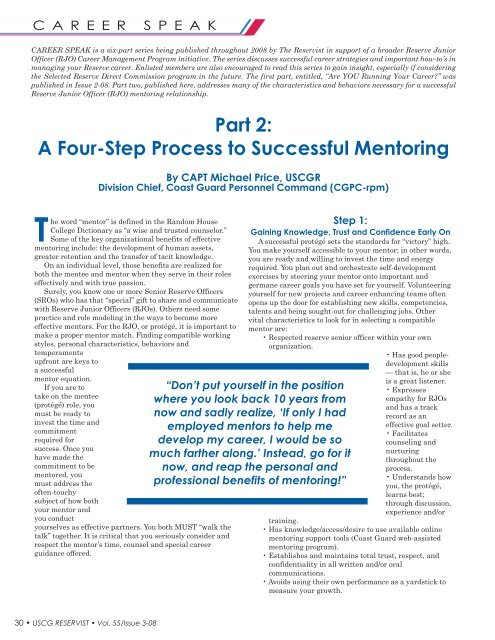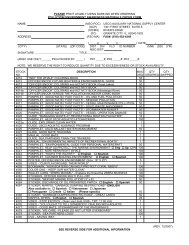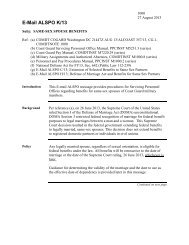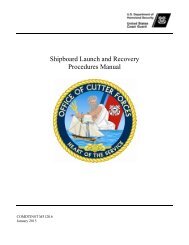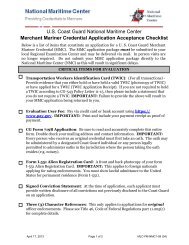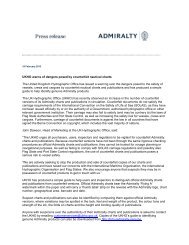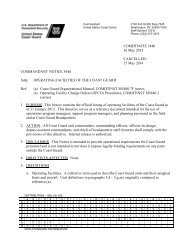Vol. 55, Issue 3-2008 - U.S. Coast Guard
Vol. 55, Issue 3-2008 - U.S. Coast Guard
Vol. 55, Issue 3-2008 - U.S. Coast Guard
Create successful ePaper yourself
Turn your PDF publications into a flip-book with our unique Google optimized e-Paper software.
C A R E E R S P E A K<br />
CAREER SPEAK is a six-part series being published throughout <strong>2008</strong> by The Reservist in support of a broader Reserve Junior<br />
Officer (RJO) Career Management Program initiative. The series discusses successful career strategies and important how-to’s in<br />
managing your Reserve career. Enlisted members are also encouraged to read this series to gain insight, especially if considering<br />
the Selected Reserve Direct Commission program in the future. The first part, entitled, “Are YOU Running Your Career?” was<br />
published in <strong>Issue</strong> 2-08. Part two, published here, addresses many of the characteristics and behaviors necessary for a successful<br />
Reserve Junior Officer (RJO) mentoring relationship.<br />
Part 2:<br />
A Four-Step Process to Successful Mentoring<br />
The word “mentor” is defined in the Random House<br />
College Dictionary as “a wise and trusted counselor.”<br />
Some of the key organizational benefits of effective<br />
mentoring include: the development of human assets,<br />
greater retention and the transfer of tacit knowledge.<br />
On an individual level, those benefits are realized for<br />
both the mentee and mentor when they serve in their roles<br />
effectively and with true passion.<br />
Surely, you know one or more Senior Reserve Officers<br />
(SROs) who has that “special” gift to share and communicate<br />
with Reserve Junior Officers (RJOs). Others need some<br />
practice and role modeling in the ways to become more<br />
effective mentors. For the RJO, or protégé, it is important to<br />
make a proper mentor match. Finding compatible working<br />
styles, personal characteristics, behaviors and<br />
temperaments<br />
upfront are keys to<br />
a successful<br />
mentor equation.<br />
If you are to<br />
take on the mentee<br />
(protégé) role, you<br />
must be ready to<br />
invest the time and<br />
commitment<br />
required for<br />
success. Once you<br />
have made the<br />
commitment to be<br />
mentored, you<br />
must address the<br />
often-touchy<br />
subject of how both<br />
your mentor and<br />
you conduct<br />
yourselves as effective partners. You both MUST “walk the<br />
talk” together. It is critical that you seriously consider and<br />
respect the mentor’s time, counsel and special career<br />
guidance offered.<br />
30 • USCG RESERVIST • <strong>Vol</strong>. <strong>55</strong>/<strong>Issue</strong> 3-08<br />
By CAPT Michael Price, USCGR<br />
Division Chief, <strong>Coast</strong> <strong>Guard</strong> Personnel Command (CGPC-rpm)<br />
Step 1:<br />
Gaining Knowledge, Trust and Confidence Early On<br />
A successful protégé sets the standards for “victory” high.<br />
You make yourself accessible to your mentor; in other words,<br />
you are ready and willing to invest the time and energy<br />
required. You plan out and orchestrate self-development<br />
exercises by steering your mentor onto important and<br />
germane career goals you have set for yourself. <strong>Vol</strong>unteering<br />
yourself for new projects and career enhancing teams often<br />
opens up the door for establishing new skills, competencies,<br />
talents and being sought-out for challenging jobs. Other<br />
vital characteristics to look for in selecting a compatible<br />
mentor are:<br />
• Respected reserve senior officer within your own<br />
organization.<br />
• Has good peopledevelopment<br />
skills<br />
— that is, he or she<br />
“Don’t put yourself in the position<br />
where you look back 10 years from<br />
now and sadly realize, ‘If only I had<br />
employed mentors to help me<br />
develop my career, I would be so<br />
much farther along.’ Instead, go for it<br />
now, and reap the personal and<br />
professional benefits of mentoring!”<br />
is a great listener.<br />
• Expresses<br />
empathy for RJOs<br />
and has a track<br />
record as an<br />
effective goal setter.<br />
• Facilitates<br />
counseling and<br />
nurturing<br />
throughout the<br />
process.<br />
• Understands how<br />
you, the protégé,<br />
learns best;<br />
through discussion,<br />
experience and/or<br />
training.<br />
• Has knowledge/access/desire to use available online<br />
mentoring support tools (<strong>Coast</strong> <strong>Guard</strong> web-assisted<br />
mentoring program).<br />
• Establishes and maintains total trust, respect, and<br />
confidentiality in all written and/or oral<br />
communications.<br />
• Avoids using their own performance as a yardstick to<br />
measure your growth.


